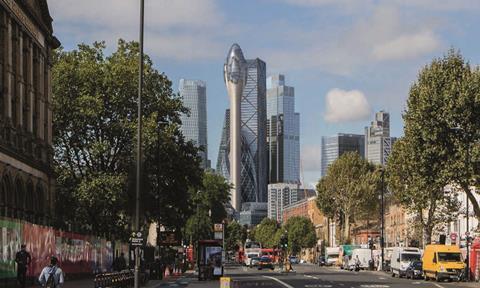Project backers seek to overturn mayor of London’s veto
The project team behind Foster & Partners’ controversial Tulip tower has formally launched an appeal over its rejected plans for the 305m tall tourist attraction.
Papers lodged with the City of London Corporation confirm that the team, backed by billionaire financier and Gherkin owner Jacob J Safra, is seeking to challenge last summer’s planning refusal for the structure, dictated by mayor of London Sadiq Khan.
Members of the City’s planning and transportation committee had given their backing to the project at a meeting in April – where Historic England’s concerns over the tower’s impact on views of the Tower of London world heritage site were rejected by elected representatives.
But the size of the project, which included multiple observation levels – including external gondolas, a restaurant and “sky bar”, and education space – in a 12-storey structure at the top of a slender concrete shaft, meant the City’s backing was subject to Khan’s approval.

The mayor used his planning powers to instruct the City to refuse consent despite their support. Khan said the proposal “would not constitute the high standard of design required for a tall building in this location” and would cause harm to the “outstanding universal value” of the Tower of London world heritage site”.
Khan’s letter to the City’s chief planning officer, Annie Hampson, said the building would also harm the historic environment beyond the Tower and “the wider skyline and the image of London”. His team had also previously criticised the project’s impact on congestion in local streets and the quality of space earmarked for the free visits the project team promised to pupils at the capital’s state schools.
The Tulip team’s challenge was lodged three days before the six-month appeal window expired. Dates for the hearing have yet to be set.

Government agency the Planning Inspectorate runs planning appeals and will appoint an inspector to oversee proceedings – with the final decision likely to be taken by the secretary of state for housing.
Secretaries of state can use their planning powers to “recover” appeals, meaning that the normal Planning Inspectorate process is followed – but the recommendations of the planning inspector overseeing the inquiry are left to the minister to either endorse or disagree with.
Last week, current housing secretary Robert Jenrick went against the advice of a planning inspector to approve PLP’s huge Westferry Printworks scheme on the Isle of Dogs in east London.

The Planning Inspectorate currently suggests a timescale of 22 weeks for “valid appeal to decision” in the case of planning inquiries. However this would not necessarily include the time taken by the Ministry of Housing, Communities and Local Government to process that decision if the appeal were recovered.
Last year Chris Hayward, the then-chair of the City’s planning and transportation committee, told Building Design he would not be surprised if the Tulip proposals went to a planning inquiry and were determined by the secretary of state.
The Tulip ticks a number of the boxes for a recovered appeal, not least “proposals giving rise to substantial regional or national controversy” and those that would have “an adverse impact on the outstanding universal value, integrity, authenticity and significance of a world heritage site”.

Government heritage advisor Historic England applauded Khan’s July decision to block the City’s resolution to approve the Tulip.
Chief executive Duncan Wilson had appeared in person before the City’s planning and transportation committee to call for the Tulip to be rejected – only to see it approved by a margin of more than two-to-one. He said Khan’s decision was a relief.
“We have long been of the opinion that this is the wrong building in the wrong place,” he said.
“We advised that its height and design – essentially a tall lift shaft with a bulge on top – would cause permanent and irreversible damage to the setting of the Tower of London and, in turn, the image and identity of the capital.
“This building did not justify harming London’s precious and irreplaceable heritage.”
Historic England told BD it was had been expecting the Tulip project team to appeal Khan’s refusal.
“It is now for the secretary of state to decide whether to take the case to public inquiry and we will decide our next steps from there,” it said.
Postscript
All images copyright Dbox


























19 Readers' comments